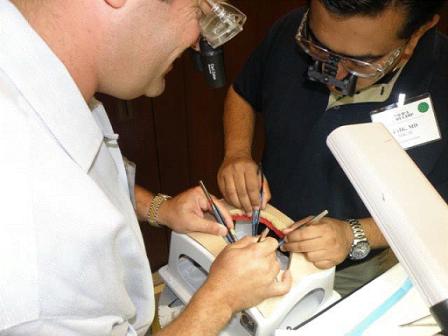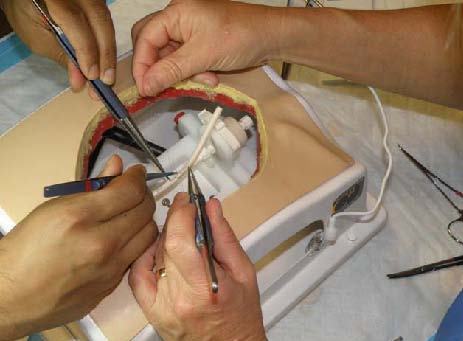As the Thoracic Surgery Director’s Association (TSDA) commences its 2011 Boot Camp July 14-17, The Chamberlain Group (TCG) is honored that their Heart Case Trainer will again be part of Boot Camp’s cardiothoracic training curriculum.
The TSDA Boot Camp is “…designed to provide incoming residents with an experiential foundation and hands-on practice in basic cardiothoracic operating skills so they are better prepared to enter the CT surgery operating arena. Resident and faculty participants will utilize simulators to enhance the learning experience and to create real-world case and emergency scenarios. The Boot Camp program is designed for incoming first-year residents at traditional programs.”
Dr. James Fann, MD, Cardiothoracic Surgeon, Stanford University and one of Boot Camp’s Directors, worked with TCG to develop Heart Case as a straightforward, affordable platform for cardiothoracic resident training. He has refined his simulation curriculum, including the use of Heart Case and other Chamberlain Group products for a number of years, incorporating it into his nation-wide skills seminars and publishing his findings in peer-reviewed journals.
At Stanford University, a pioneer of various forms of immersive and simulation-based learning, Dr Fann co-directs the CVS-Sim Center as part of the Stanford Cardiothoracic Surgery curriculum. With intent to improve skill acquisition in mitral valve surgery, he envisioned a heart trainer that was anatomically accurate and compact enough for travel. In addition to meeting his specific travel- to-train needs, the beauty of this concept was its far reaching ramifications. Dr. Fann’s premise was that limited exposure and visualization, compounded by technical complexity, had adversely affected resident training in mitral valve surgery. A portable trainer, leveraged for common use, opened up a world of potential for residents: to train on their own time, outside the facility. And so it was that Heart Case came to be.
Designed specifically to address the hands-on needs of the cardiothoracic resident, the platform is intended for training
- CABG, both Proximal and Distal Anastomoses
- Aortic Cannulation
- End-to-Side Anastomosis on small vessels
- Mitral Valve Procedures
- Aortic Valve Replacement
Via a common mating plate attached to an adjustable locking arm within the sternotomy of Heart Case, the user is able to place disposable mimetic anatomy for each of the modules and train the selected procedures. Additionally, the adjustment of the arm within Heart Case permits the trainer to challenge the trainee with increasing levels of difficulty as access to the operative anatomy is limited in successive training. Repeatability and deliberate practice, hallmarks of effective training, are achievable with Heart Case in a portable, safe, and cost-effective environment.
To quote Dr. Fann from his training initiative Senior Tour January 2011, “. . .Simulation provides the resident with an understanding of the ideal needle angle for suture placement, effective knot-tying in a deep confined space, placing sutures in the valve sewing cuff, and seating the valve prosthesis.”
Residents at Boot Camp will participate in five cardiac and thoracic training sessions, including vessel anastomosis, cardiopulmonary bypass skills, one lung ventilation, hilar dissection/lobectomy, and aortic valve surgery.
Heart Case will be used in the CBP Skills, Anastomosis and Aortic Valve courses at this year’s Boot Camp.


